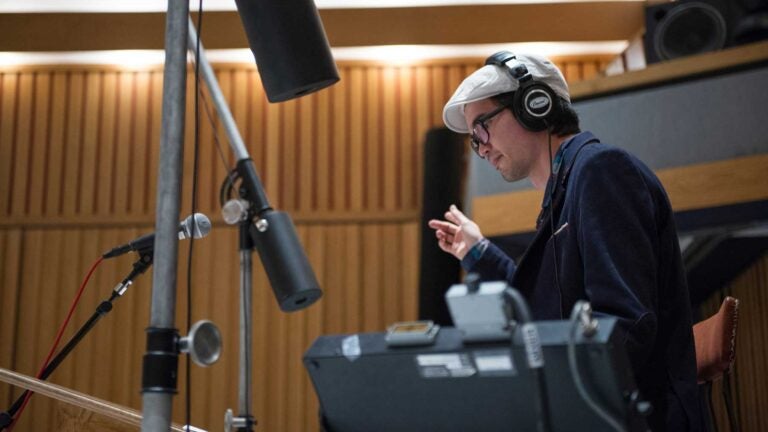
USC Thornton announces five new master’s degree programs
The school is adding the programs to stay ahead of major changes in the music industry, dean says
The USC Thornton School of Music is unveiling five new master’s degree programs in contemporary teaching practice, music industry, community music, arts leadership and screen scoring.
The degrees are a response to seismic changes in the music industry and in the music teaching and learning climate.
“We are trying to innovate our way ahead of the changes,” said Robert Cutietta, dean of USC Thornton. “Master’s degrees traditionally expand what you learn as an undergraduate. These five programs are designed to teach students new skills and to take their passions for a wide variety of music and turn them into new ways to imagine a contemporary music career.”
The programs vary in length from one to two years. Contemporary teaching practice and music industry will begin classes in May; the community music, screen scoring and arts leadership programs will begin in fall 2018.
Three of the degrees — in community music, contemporary teaching practice and screen scoring — are designed for students who hold undergraduate degrees in music performance or composition and want to expand their musical toolkit. The master’s degree in arts leadership accepts students with a bachelor’s degree (not necessarily in an arts-related field), but expects students to have three to five years as a working artist. Music industry will accept students without a previous music degree, but with a professional interest in music supervision, live concert promotion, music entrepreneurship or the recording industry.
All five new degrees are the products of faculty committees taking serious looks at skills needed by musicians in business, education and community engagement.
Cutietta has emerged as one of the nation’s leading voices for reimaging music education. In addition to challenging his own faculty to create degrees that reflect current realities in the musical landscape, he has written and spoken widely on the topic.
Arts leadership
The arts leadership degree is aimed at artists, arts administrators and cultural entrepreneurs who want to expand their personal vision and create a life and career for themselves in the arts. The degree takes advantage of the significant resources of all six arts schools at USC: music, art and design, architecture, dance, dramatic arts and cinematic arts, and graduates will be equipped to create and lead their own ensembles, programs and arts organizations around the world.
Community music
Combining skill sets in music education, community engagement and advocacy, the four-semester Master of Music in Community Music is focused on bringing music instruction and performance into non-traditional settings, such as prisons, hospitals, senior living communities and centers for marginalized and disadvantaged people of all ages. It’s a growing career option for musicians looking to move beyond the classroom or concert stage to explore service-oriented work.
Contemporary teaching practice
For those interested in music teaching and learning in K-12 schools, the contemporary teaching practice degree will help them face a changed academic environment. Teachers now need to be nimble as classrooms become more culturally diverse and music learners’ tastes and expectations continue to diverge from the traditional instruments, ensemble types and repertoire of the Western canon.
In collaboration with the USC Rossier School of Education, the degree provides a credential path for graduate music students who wish to teach in a variety of K-12 schools in California and beyond. The curriculum will give graduates the tools to lead a choir, orchestra or marching band in the morning, and jazz sextet, a cappella group or mariachi band in the afternoon. They will be equally prepared to teach a school’s Advanced Placement music theory course and electives in keyboarding, electric guitar or songwriting.
“We see an opportunity for supplementing and enhancing traditional school programs that only feature big ensemble programs,” Cutietta said. “A wider variety of students are deeply interested in creating their own music in addition to reproducing the music of others,” he said.
Screen scoring
Screen scoring has been taught at USC Thornton for decades as a certificate program, but the highly competitive, full-time program has been reimagined as a master’s degree. The two-semester program accepts a maximum of 20 students who matriculate as a cohort. Students will learn how to compose, conduct and produce music for screens of all types and for live action and animated films, as well as video games and virtual reality.
The program has always had close collaborations with the USC School of Cinematic Arts, but the master’s degree will allow students to take two of their courses at SCA. As in the past, Screen Scoring students will compose and score music for at least five USC student films, creating relationships between composers and filmmakers that have been shown to extend into later professional collaborations.
Music industry
The music industry master’s degree starts in May and lasts three semesters, with the third semester being an internship. Instead of a thesis, students collaborate on a hands-on portfolio project, such as producing a live music event, rolling out an album campaign or creating a video series. The degree offers four emphasis options: music supervision/visual media, the live music business, music entrepreneurship and the recording industry. Courses in artist management, music publishing, music instrument manufacturing/distribution and radio are options, as are business courses at the USC Marshall School of Business.
USC Thornton has offered an undergraduate degree in music industry for 20 years, taking advantage of the school’s location at the epicenter of the music, film, television and video game industries. The new master’s degree is not a continuation for those holding the undergraduate degree. Rather, it is geared toward musicians and other students with a music background or a lifelong passion for music. As the record industry has shrunk to about a third of its former size in those past two decades, the music industry curriculum has expanded to the industry segments that are growing, such as live music and music supervision.
